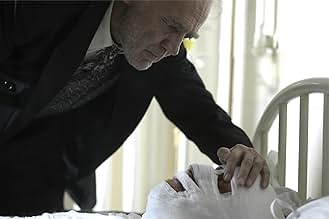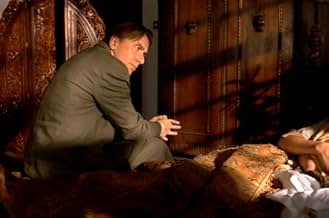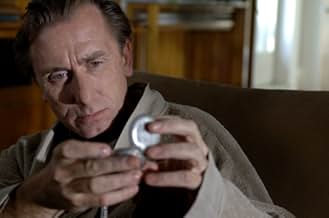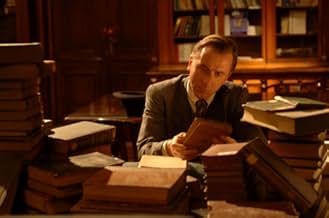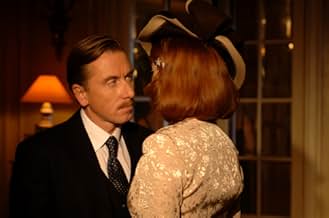CALIFICACIÓN DE IMDb
6.1/10
15 k
TU CALIFICACIÓN
Tim Roth interpreta a Dominic Matei, un profesor cuya vida sufre un cataclismo en los oscuros años previos a la Segunda Guerra Mundial. Convertido en fugitivo, Matei vagará por diversos país... Leer todoTim Roth interpreta a Dominic Matei, un profesor cuya vida sufre un cataclismo en los oscuros años previos a la Segunda Guerra Mundial. Convertido en fugitivo, Matei vagará por diversos países.Tim Roth interpreta a Dominic Matei, un profesor cuya vida sufre un cataclismo en los oscuros años previos a la Segunda Guerra Mundial. Convertido en fugitivo, Matei vagará por diversos países.
- Dirección
- Guionistas
- Elenco
- Premios
- 1 premio ganado y 1 nominación en total
Dan Astileanu
- Professor
- (as Dan Astilean)
- Dirección
- Guionistas
- Todo el elenco y el equipo
- Producción, taquilla y más en IMDbPro
Opiniones destacadas
This is definitely not everyone's cup of tea and has a pretty good chance of becoming a cult film. It explores major philosophic subjects from a dialectic angle, which might confuse pedestrians. In a nutshell: an elderly professor is challenged by his inability to complete his life's work. He is struck by lightning and gets the opportunity to observe life from a meta-human POV. He realizes that intellect, love , morals and reality in general are always ambiguous. IMO one must have some intellectual baggage, life experience and artistic curiosity in order to appreciate the profoundness of this film. Artistically, the film is very stylized and has a rather cold feel to it, something that might deter and alienate the viewer from actually empathizing with any of the characters. However, it's quite clever and stays with you after watching it. I would say that it felt to me a bit like a Darren Aronofsky film combined with Greenaway's Tulse Luper.
It was bound to happen that Youth Without Youth, the first film written and directed by Francis Ford Coppola in fifteen years (the first directed in ten), would be lauded by the critics for not being a real "comeback" kind of project. It's surreal, philosophical, mystical, and even has a mood about it that calls as a throwback to old romantic melodramas of the 40s and 50s (hence the opening titles). It's not even any kind of great film. It's pretentious in a few stretches, maybe more-so, and it takes a convoluted explanation that comes second in 2007 film only to Southland Tales for being more complex and bizarre. But unlike Kelly's film, Coppola at least has a hold on what he's doing, or what he's trying to accomplish. Coppola once said that art is all about taking riks, and to make films without risk is like sex without children.
In the grand scheme of things, at least with his career, Youth Without Youth seems to be slightly minor a risk when compared to the likes of Apocalypse Now or One From the Heart. But it's a risk that Coppola takes all the same, and through the intellectual thicket (which, contrary to some critics, isn't completely dense) there is some truly potent cinematic expression. So, the plot, the plot... A linguistics professor, Dominic (Tim Roth) is an old man when he gets struck by lightning in 1938, then proceeds to age back to 40 in recovery, only to then find that he's being watched- and planned for abduction- by Nazi scientists who want to use his newfound super-powers (mostly that he can, at times, harness powerful energy, as Dominic describes as "out of a science fiction novel"). This might be enough for a movie alone, but there's more- years later, a woman from Dominic's past (from before the lightning strike) appears again, also still apparently young, and she can talk in ancient languages, so then...
Yeah, I could go on with that. Suffice to say there's also talk about how this whole time-warp connects into the realm of consciousness itself, or what makes up knowledge or the pursuit of language, and all relating to time, leading up to an ending that flips around itself, all inspired by an old Chinese tale that goes around and around. What it means I still can't quite figure, and it at least shows Coppola won't spoon-feed any kind of easy ending (even the whole "it's only a dream" concept has some holes to fill, leaving ambiguity as something a little more logical). Frankly, I've never read any of the Mircea Eliade's writings, but there's a lot to it that strikes up references to other works. I couldn't help but think the plot, and its themes, were as though Philip K. Dick was forced to make a melodrama- on his own terms- from an unpublished book. Or that there was a connection to the Fountain, or even Dr. Who or something else. The comparisons are endless.
But what remains, at the end of trying to figure out what the hell Youth Without Youth will say as its ultimate message, is an original work, sincerely with the verve of a filmmaker who just says 'f*** it' and makes the movie he wants to make on his own terms (with, subsequently, his own money). If there is any risk to the project it's that Coppola gambles on narrative cohesion with elements like two Dominics following the lightning strike (one of which, of course, prods the other to complete his life's work as a "failure"), or the power of emotion with two people in love vs. the tremendous, daunting task of unlocking secrets of language and consciousness and what time even means. Couple this with technique that veers into the abstract, with upside down camera angles and upfront anti-Nazi imagery ala Indiana Jones, and a music that strikes up the most melancholy and precise of aforementioned melodrama, and it becomes the weirdest hybrid Coppola's ever made.
And yet, and yet, if Youth Without Youth is one thing above all else, it's, well... interesting. I never felt like getting up and even leaving to go to the bathroom much less leaving the film for good. I cared about Dominic and Veronica as I did the direction Coppola took the story (even if pretensions, particularly in the second half, seemed to loop into the equation). And Roth is, not to forget to mention, terrific in the role, seeming to understand where his character may (or may not) be headed as he continues with his research and finds that he is sort of doomed in time unless he goes down a certain path. He even gets to dig into a certain subdued humor underneath the skin of the picture, where a few times there's some laughs to be had at the expense of what's going on with Dominic, as though some old philosopher discovered a comic book and incorporated it into his character. It's a very strange movie experience, and not one I can easily recommend. But I do all the same, and Coppola fans will either like it or, as case is turning out, they wont.
In the grand scheme of things, at least with his career, Youth Without Youth seems to be slightly minor a risk when compared to the likes of Apocalypse Now or One From the Heart. But it's a risk that Coppola takes all the same, and through the intellectual thicket (which, contrary to some critics, isn't completely dense) there is some truly potent cinematic expression. So, the plot, the plot... A linguistics professor, Dominic (Tim Roth) is an old man when he gets struck by lightning in 1938, then proceeds to age back to 40 in recovery, only to then find that he's being watched- and planned for abduction- by Nazi scientists who want to use his newfound super-powers (mostly that he can, at times, harness powerful energy, as Dominic describes as "out of a science fiction novel"). This might be enough for a movie alone, but there's more- years later, a woman from Dominic's past (from before the lightning strike) appears again, also still apparently young, and she can talk in ancient languages, so then...
Yeah, I could go on with that. Suffice to say there's also talk about how this whole time-warp connects into the realm of consciousness itself, or what makes up knowledge or the pursuit of language, and all relating to time, leading up to an ending that flips around itself, all inspired by an old Chinese tale that goes around and around. What it means I still can't quite figure, and it at least shows Coppola won't spoon-feed any kind of easy ending (even the whole "it's only a dream" concept has some holes to fill, leaving ambiguity as something a little more logical). Frankly, I've never read any of the Mircea Eliade's writings, but there's a lot to it that strikes up references to other works. I couldn't help but think the plot, and its themes, were as though Philip K. Dick was forced to make a melodrama- on his own terms- from an unpublished book. Or that there was a connection to the Fountain, or even Dr. Who or something else. The comparisons are endless.
But what remains, at the end of trying to figure out what the hell Youth Without Youth will say as its ultimate message, is an original work, sincerely with the verve of a filmmaker who just says 'f*** it' and makes the movie he wants to make on his own terms (with, subsequently, his own money). If there is any risk to the project it's that Coppola gambles on narrative cohesion with elements like two Dominics following the lightning strike (one of which, of course, prods the other to complete his life's work as a "failure"), or the power of emotion with two people in love vs. the tremendous, daunting task of unlocking secrets of language and consciousness and what time even means. Couple this with technique that veers into the abstract, with upside down camera angles and upfront anti-Nazi imagery ala Indiana Jones, and a music that strikes up the most melancholy and precise of aforementioned melodrama, and it becomes the weirdest hybrid Coppola's ever made.
And yet, and yet, if Youth Without Youth is one thing above all else, it's, well... interesting. I never felt like getting up and even leaving to go to the bathroom much less leaving the film for good. I cared about Dominic and Veronica as I did the direction Coppola took the story (even if pretensions, particularly in the second half, seemed to loop into the equation). And Roth is, not to forget to mention, terrific in the role, seeming to understand where his character may (or may not) be headed as he continues with his research and finds that he is sort of doomed in time unless he goes down a certain path. He even gets to dig into a certain subdued humor underneath the skin of the picture, where a few times there's some laughs to be had at the expense of what's going on with Dominic, as though some old philosopher discovered a comic book and incorporated it into his character. It's a very strange movie experience, and not one I can easily recommend. But I do all the same, and Coppola fans will either like it or, as case is turning out, they wont.
I was flabbergasted to see that a lot of the comments for this film were negative. The fact that the movie is not of a commercial nature doesn't make it bad, it just makes it less accessible. In this manner, it is just as bad for movies as a science paper is for publications.
Anyway, the film is based on a book of Romanian Mircea Eliade, one that I didn't read. Actually, I didn't read most of Eliade's work for the very reasons people bad mouthed this film. Then I entered adolescence :-P.
The film, though, is a resounding success to me. Not only that it is well done, but at the end of it, it let me wanting to understand more and to read the book. Maybe I will one of these days. As the film is impossible to summarize here, I will get to a quick conclusion.
Bottom line: a heavy feeling film, with a complex script and a lot of philosophical ideas of Eliade's scattered through the story; also some of his personal obsessions: orientalism and the loss of the love of his life. I personally think it was a great movie, but it became a bit confused at the end.
Anyway, the film is based on a book of Romanian Mircea Eliade, one that I didn't read. Actually, I didn't read most of Eliade's work for the very reasons people bad mouthed this film. Then I entered adolescence :-P.
The film, though, is a resounding success to me. Not only that it is well done, but at the end of it, it let me wanting to understand more and to read the book. Maybe I will one of these days. As the film is impossible to summarize here, I will get to a quick conclusion.
Bottom line: a heavy feeling film, with a complex script and a lot of philosophical ideas of Eliade's scattered through the story; also some of his personal obsessions: orientalism and the loss of the love of his life. I personally think it was a great movie, but it became a bit confused at the end.
Youth Without Youth is a pretentious mess. Pretensiousness is underrated in films today, but that doesn't save it from not working. Coppolla seems to still remember the mechanics of film making, but he hasn't recovered the fervor yet. His new film is a beautiful, and sometimes interesting film with fine performances. The fact that it doesn't work is somewhat surprising, and mostly I think due to Coppolla's script and the mediocre editing. It is almost worth seeing just for the cinematography, and the performances by Roth and particularly Lara who are fantastic, but in the end it just isn't quite worth it. No matter how much I wanted to like it, I couldn't. It just didn't quite work.
I was surprised and fortunate to find a movie of this caliber by chance, since I'd never heard of the release; at first, I actually thought it was an old movie, one that I hadn't seen.
I' am bewildered and frankly frightened by the obscene IMDb rating of "6.6" - the current evaluation of this movie, by the audiences frequenting these boards - a prime example of the fact that taste is a controversial matter.
Albeit, this movie isn't for everyone; if you regard the world as being a solved puzzle, if you've figured it all out; what it's all about, if nothing mystifies or captivates your senses and entelechy, if you are utterly unenchanted by the magical and mysterious nature of reality, this movie will be a huge disappointment for you. Please don't watch it, since it's not made for you, and hence, you will distort the perception of the movie. In-fact, if any of the latter apply, don't watch this movie, it will only bring grieve.
The movie is stunning in its appearance, the characters are believable, the story is uncompromising, relentless, of an epic nature, and the atmosphere is hypnotic and enchanting.
I was sucked into the world of this strange professor.
I only regard the ending as being less then perfect; however, such movies are never easy to end.
An essential and unique experience.
I' am bewildered and frankly frightened by the obscene IMDb rating of "6.6" - the current evaluation of this movie, by the audiences frequenting these boards - a prime example of the fact that taste is a controversial matter.
Albeit, this movie isn't for everyone; if you regard the world as being a solved puzzle, if you've figured it all out; what it's all about, if nothing mystifies or captivates your senses and entelechy, if you are utterly unenchanted by the magical and mysterious nature of reality, this movie will be a huge disappointment for you. Please don't watch it, since it's not made for you, and hence, you will distort the perception of the movie. In-fact, if any of the latter apply, don't watch this movie, it will only bring grieve.
The movie is stunning in its appearance, the characters are believable, the story is uncompromising, relentless, of an epic nature, and the atmosphere is hypnotic and enchanting.
I was sucked into the world of this strange professor.
I only regard the ending as being less then perfect; however, such movies are never easy to end.
An essential and unique experience.
¿Sabías que…?
- TriviaLanguages spoken in the film are English, French, Italian, Mandarin, German, Russian, Latin, Armenian, Sanskrit, Egyptian (not Arabic), Babylonian and a little Romanian. The ancient Sanskrit, Egyptian and Babylonian are authentic, researched in ancient texts and manuscripts by a team of expert linguists. The film also includes an artificial, "made-up" language, done with such integrity that it could provide the rudimentary basis of a new language.
- ErroresThe panoramic x ray shown when the teeth of the main character start to change is obviously from a 12 years old person as are clearly visible temporal molars (that are not present in adults) and their adult successors.
- Bandas sonorasMiddle Village
Written by Lev Zhurbin (as Lev 'Ljova' Zhurbin)
Performed by Lev Zhurbin (as Lev 'Ljova' Zhurbin) on viola and Balogh, Kálmán (cymbalom)
Selecciones populares
Inicia sesión para calificar y agrega a la lista de videos para obtener recomendaciones personalizadas
- How long is Youth Without Youth?Con tecnología de Alexa
Detalles
- Fecha de lanzamiento
- Países de origen
- Sitio oficial
- Idiomas
- También se conoce como
- Youth Without Youth
- Locaciones de filmación
- Productoras
- Ver más créditos de la compañía en IMDbPro
Taquilla
- Presupuesto
- USD 5,000,000 (estimado)
- Total en EE. UU. y Canadá
- USD 244,397
- Fin de semana de estreno en EE. UU. y Canadá
- USD 28,550
- 16 dic 2007
- Total a nivel mundial
- USD 2,624,759
- Tiempo de ejecución2 horas 4 minutos
- Color
- Mezcla de sonido
- Relación de aspecto
- 2.35 : 1
Contribuir a esta página
Sugiere una edición o agrega el contenido que falta

Principales brechas de datos
By what name was El hombre sin edad (2007) officially released in Canada in French?
Responda






